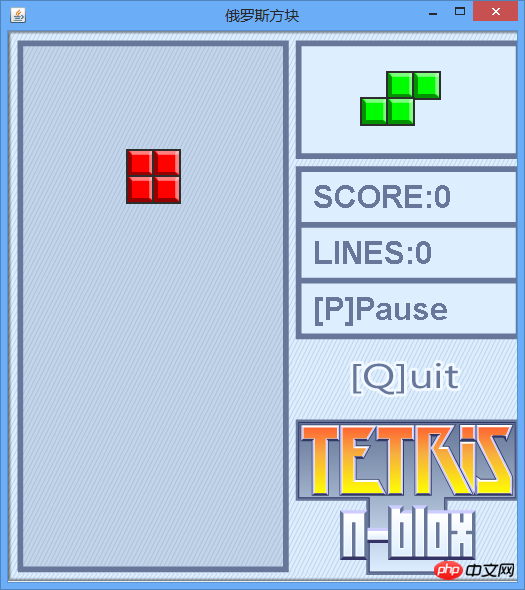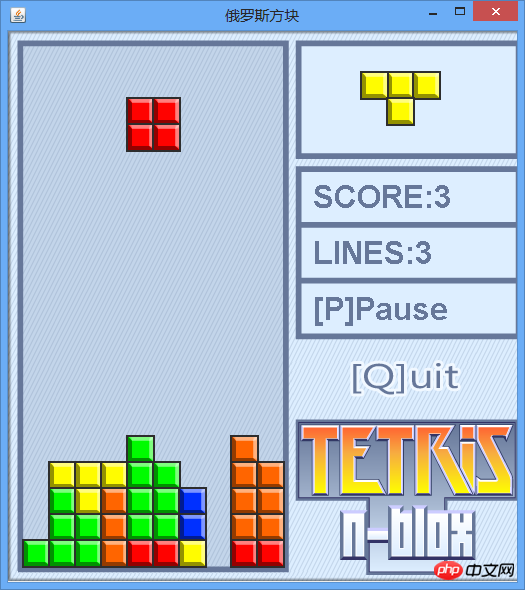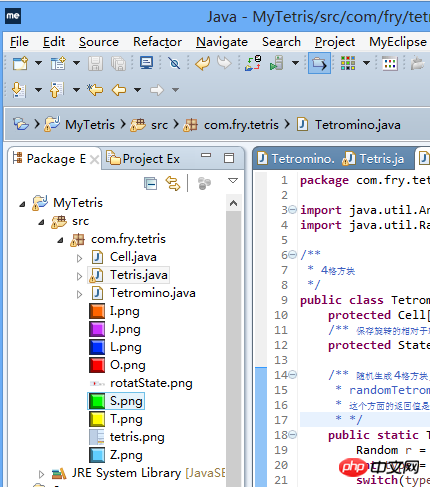这篇文章主要介绍了Java 小游戏开发之俄罗斯方块的相关资料,这里实现俄罗斯方块的实例和实现效果给大家看下,学习java基础的朋友的好资料,需要的朋友可以参考下
Java项目 俄罗斯方块
一、心得
二、游戏实例
游戏截图



目录结构

三、代码
1、主界面 Tetris.java
package com.fry.tetris;
import java.util.Arrays;
import java.util.Random;
/**
* 4格方块
*/
public class Tetromino {
protected Cell[] cells = new Cell[4];
/** 保存旋转的相对于轴位置状态 */
protected State[] states;
/** 随机生成 4格方块, 使用简单工厂方法模式!
* randomTetromino 随机生成一个四格方块
* 这个方面的返回值是多态的!
* */
public static Tetromino randomTetromino(){
Random r = new Random();
int type = r.nextInt(7);
switch(type){
case 0: return new T();
case 1: return new I();
case 2: return new J();
case 3: return new L();
case 4: return new O();
case 5: return new S();
case 6: return new Z();
}
return null;
}
public Cell[] getCells() {
return cells;
}
/** 下落 */
public void softDrop(){
for(int i=0; i<cells.length; i++){
cells[i].moveDown();
}
}
public void moveRight(){
//System.out.println("moveRight()");
for(int i=0; i<cells.length; i++){
this.cells[i].moveRight();
}
}
public void moveLeft(){
for(int i=0; i<cells.length; i++){
cells[i].moveLeft();
}
}
private int index = 100000;
/** 在 Tetromino 上添加方法 */
public void rotateRight() {
index++;//index = 10001
// index % states.length = 10001 % 4 = 1
State s = states[index%states.length];//s1
// [0] + s1 = [1]
Cell o = cells[0];//获取当前的轴
//轴与相对位置的和作为旋转以后的格子位置
cells[1].setRow(o.getRow()+s.row1);
cells[1].setCol(o.getCol()+s.col1);
cells[2].setRow(o.getRow()+s.row2);
cells[2].setCol(o.getCol()+s.col2);
cells[3].setRow(o.getRow()+s.row3);
cells[3].setCol(o.getCol()+s.col3);
}
/** 在 Tetromino 上添加方法 */
public void rotateLeft() {
index--;//index = 10001
// index % states.length = 10001 % 4 = 1
State s = states[index%states.length];//s1
// [0] + s1 = [1]
Cell o = cells[0];//获取当前的轴
cells[1].setRow(o.getRow()+s.row1);
cells[1].setCol(o.getCol()+s.col1);
cells[2].setRow(o.getRow()+s.row2);
cells[2].setCol(o.getCol()+s.col2);
cells[3].setRow(o.getRow()+s.row3);
cells[3].setCol(o.getCol()+s.col3);
}
@Override
public String toString() {
return Arrays.toString(cells);
}
/** Tetromino 类中添加的 内部类 用于记录旋转状态 */
protected class State{
int row0,col0,row1,col1,row2,col2,row3,col3;
public State(int row0, int col0, int row1, int col1,
int row2, int col2,
int row3, int col3) {
this.row0 = row0;
this.col0 = col0;
this.row1 = row1;
this.col1 = col1;
this.row2 = row2;
this.col2 = col2;
this.row3 = row3;
this.col3 = col3;
}
}
}//Tetromino 类的结束
class T extends Tetromino{
public T() {
cells[0] = new Cell(0, 4, Tetris.T);
cells[1] = new Cell(0, 3, Tetris.T);
cells[2] = new Cell(0, 5, Tetris.T);
cells[3] = new Cell(1, 4, Tetris.T);
states = new State[]{
new State(0,0, 0,-1, 0,1, 1, 0),
new State(0,0, -1,0, 1,0, 0,-1),
new State(0,0, 0,1, 0,-1, -1,0),
new State(0,0, 1,0, -1,0, 0,1)};
}
}
class I extends Tetromino{
public I() {
cells[0] = new Cell(0, 4, Tetris.I);
cells[1] = new Cell(0, 3, Tetris.I);
cells[2] = new Cell(0, 5, Tetris.I);
cells[3] = new Cell(0, 6, Tetris.I);
states = new State[]{
new State(0,0, 0,1, 0,-1, 0,-2),
new State(0,0, -1,0, 1,0,2,0)};
}
}
class L extends Tetromino {
public L() {
cells[0] = new Cell(0, 4, Tetris.L);
cells[1] = new Cell(0, 3, Tetris.L);
cells[2] = new Cell(0, 5, Tetris.L);
cells[3] = new Cell(1, 3, Tetris.L);
states = new State[]{
new State(0,0, 0,-1, 0,1, 1,-1 ),
new State(0,0, -1,0, 1,0, -1,-1),
new State(0,0, 0,1, 0,-1, -1,1),
new State(0,0, 1,0, -1,0, 1,1)};
}
}
class J extends Tetromino {
public J() {
cells[0] = new Cell(0, 4, Tetris.J);
cells[1] = new Cell(0, 3, Tetris.J);
cells[2] = new Cell(0, 5, Tetris.J);
cells[3] = new Cell(1, 5, Tetris.J);
states = new State[]{
new State(0,0, 0,-1, 0,1, 1,1),
new State(0,0, -1,0, 1,0, 1,-1),
new State(0,0, 0,1, 0,-1, -1,-1),
new State(0,0, 1,0, -1,0, -1,1 )};
}
}
class S extends Tetromino {
public S() {
cells[0] = new Cell(0, 4, Tetris.S);
cells[1] = new Cell(0, 5, Tetris.S);
cells[2] = new Cell(1, 3, Tetris.S);
cells[3] = new Cell(1, 4, Tetris.S);
states = new State[]{
new State(0,0, 0,1, 1,-1, 1,0 ),
new State(0,0, -1,0, 1,1, 0,1 )};
}
}
class Z extends Tetromino {
public Z() {
cells[0] = new Cell(1, 4, Tetris.Z);
cells[1] = new Cell(0, 3, Tetris.Z);
cells[2] = new Cell(0, 4, Tetris.Z);
cells[3] = new Cell(1, 5, Tetris.Z);
states = new State[]{
new State(0,0, -1,-1, -1,0, 0,1 ),
new State(0,0, -1,1, 0,1, 1,0 )};
}
}
class O extends Tetromino {
public O() {
cells[0] = new Cell(0, 4, Tetris.O);
cells[1] = new Cell(0, 5, Tetris.O);
cells[2] = new Cell(1, 4, Tetris.O);
cells[3] = new Cell(1, 5, Tetris.O);
states = new State[]{
new State(0,0, 0,1, 1,0, 1,1 ),
new State(0,0, 0,1, 1,0, 1,1 )};
}
}二、Cell.java
package com.fry.tetris;
import java.awt.Image;
/**
* 格子
* 每一个小格子,就有所在的行 列 和图片
*/
public class Cell {
private int row;
private int col;
//private int color;
private Image image;//格子的贴图
public Cell() {
}
public Cell(int row, int col, Image image) {
super();
this.row = row;
this.col = col;
this.image = image;
}
public int getRow() {
return row;
}
public void setRow(int row) {
this.row = row;
}
public int getCol() {
return col;
}
public void setCol(int col) {
this.col = col;
}
public Image getImage() {
return image;
}
public void setImage(Image image) {
this.image = image;
}
public void moveRight(){
col++;
//System.out.println("Cell moveRight()" + col);
}
public void moveLeft(){
col--;
}
public void moveDown(){
row++;
}
@Override
public String toString() {
return "["+row+","+col+"]";
}
}三、功能实现 Tetromino.java
package com.fry.tetris;
import java.util.Arrays;
import java.util.Random;
/**
* 4格方块
*/
public class Tetromino {
protected Cell[] cells = new Cell[4];
/** 保存旋转的相对于轴位置状态 */
protected State[] states;
/** 随机生成 4格方块, 使用简单工厂方法模式!
* randomTetromino 随机生成一个四格方块
* 这个方面的返回值是多态的!
* */
public static Tetromino randomTetromino(){
Random r = new Random();
int type = r.nextInt(7);
switch(type){
case 0: return new T();
case 1: return new I();
case 2: return new J();
case 3: return new L();
case 4: return new O();
case 5: return new S();
case 6: return new Z();
}
return null;
}
public Cell[] getCells() {
return cells;
}
/** 下落 */
public void softDrop(){
for(int i=0; i<cells.length; i++){
cells[i].moveDown();
}
}
public void moveRight(){
//System.out.println("moveRight()");
for(int i=0; i<cells.length; i++){
this.cells[i].moveRight();
}
}
public void moveLeft(){
for(int i=0; i<cells.length; i++){
cells[i].moveLeft();
}
}
private int index = 100000;
/** 在 Tetromino 上添加方法 */
public void rotateRight() {
index++;//index = 10001
// index % states.length = 10001 % 4 = 1
State s = states[index%states.length];//s1
// [0] + s1 = [1]
Cell o = cells[0];//获取当前的轴
//轴与相对位置的和作为旋转以后的格子位置
cells[1].setRow(o.getRow()+s.row1);
cells[1].setCol(o.getCol()+s.col1);
cells[2].setRow(o.getRow()+s.row2);
cells[2].setCol(o.getCol()+s.col2);
cells[3].setRow(o.getRow()+s.row3);
cells[3].setCol(o.getCol()+s.col3);
}
/** 在 Tetromino 上添加方法 */
public void rotateLeft() {
index--;//index = 10001
// index % states.length = 10001 % 4 = 1
State s = states[index%states.length];//s1
// [0] + s1 = [1]
Cell o = cells[0];//获取当前的轴
cells[1].setRow(o.getRow()+s.row1);
cells[1].setCol(o.getCol()+s.col1);
cells[2].setRow(o.getRow()+s.row2);
cells[2].setCol(o.getCol()+s.col2);
cells[3].setRow(o.getRow()+s.row3);
cells[3].setCol(o.getCol()+s.col3);
}
@Override
public String toString() {
return Arrays.toString(cells);
}
/** Tetromino 类中添加的 内部类 用于记录旋转状态 */
protected class State{
int row0,col0,row1,col1,row2,col2,row3,col3;
public State(int row0, int col0, int row1, int col1,
int row2, int col2,
int row3, int col3) {
this.row0 = row0;
this.col0 = col0;
this.row1 = row1;
this.col1 = col1;
this.row2 = row2;
this.col2 = col2;
this.row3 = row3;
this.col3 = col3;
}
}
}//Tetromino 类的结束
class T extends Tetromino{
public T() {
cells[0] = new Cell(0, 4, Tetris.T);
cells[1] = new Cell(0, 3, Tetris.T);
cells[2] = new Cell(0, 5, Tetris.T);
cells[3] = new Cell(1, 4, Tetris.T);
states = new State[]{
new State(0,0, 0,-1, 0,1, 1, 0),
new State(0,0, -1,0, 1,0, 0,-1),
new State(0,0, 0,1, 0,-1, -1,0),
new State(0,0, 1,0, -1,0, 0,1)};
}
}
class I extends Tetromino{
public I() {
cells[0] = new Cell(0, 4, Tetris.I);
cells[1] = new Cell(0, 3, Tetris.I);
cells[2] = new Cell(0, 5, Tetris.I);
cells[3] = new Cell(0, 6, Tetris.I);
states = new State[]{
new State(0,0, 0,1, 0,-1, 0,-2),
new State(0,0, -1,0, 1,0,2,0)};
}
}
class L extends Tetromino {
public L() {
cells[0] = new Cell(0, 4, Tetris.L);
cells[1] = new Cell(0, 3, Tetris.L);
cells[2] = new Cell(0, 5, Tetris.L);
cells[3] = new Cell(1, 3, Tetris.L);
states = new State[]{
new State(0,0, 0,-1, 0,1, 1,-1 ),
new State(0,0, -1,0, 1,0, -1,-1),
new State(0,0, 0,1, 0,-1, -1,1),
new State(0,0, 1,0, -1,0, 1,1)};
}
}
class J extends Tetromino {
public J() {
cells[0] = new Cell(0, 4, Tetris.J);
cells[1] = new Cell(0, 3, Tetris.J);
cells[2] = new Cell(0, 5, Tetris.J);
cells[3] = new Cell(1, 5, Tetris.J);
states = new State[]{
new State(0,0, 0,-1, 0,1, 1,1),
new State(0,0, -1,0, 1,0, 1,-1),
new State(0,0, 0,1, 0,-1, -1,-1),
new State(0,0, 1,0, -1,0, -1,1 )};
}
}
class S extends Tetromino {
public S() {
cells[0] = new Cell(0, 4, Tetris.S);
cells[1] = new Cell(0, 5, Tetris.S);
cells[2] = new Cell(1, 3, Tetris.S);
cells[3] = new Cell(1, 4, Tetris.S);
states = new State[]{
new State(0,0, 0,1, 1,-1, 1,0 ),
new State(0,0, -1,0, 1,1, 0,1 )};
}
}
class Z extends Tetromino {
public Z() {
cells[0] = new Cell(1, 4, Tetris.Z);
cells[1] = new Cell(0, 3, Tetris.Z);
cells[2] = new Cell(0, 4, Tetris.Z);
cells[3] = new Cell(1, 5, Tetris.Z);
states = new State[]{
new State(0,0, -1,-1, -1,0, 0,1 ),
new State(0,0, -1,1, 0,1, 1,0 )};
}
}
class O extends Tetromino {
public O() {
cells[0] = new Cell(0, 4, Tetris.O);
cells[1] = new Cell(0, 5, Tetris.O);
cells[2] = new Cell(1, 4, Tetris.O);
cells[3] = new Cell(1, 5, Tetris.O);
states = new State[]{
new State(0,0, 0,1, 1,0, 1,1 ),
new State(0,0, 0,1, 1,0, 1,1 )};
}
}Atas ialah kandungan terperinci Java实现俄罗斯方块小游戏的图文代码分享. Untuk maklumat lanjut, sila ikut artikel berkaitan lain di laman web China PHP!
 Bagaimanakah saya menggunakan Maven atau Gradle untuk Pengurusan Projek Java Lanjutan, Membina Automasi, dan Resolusi Ketergantungan?Mar 17, 2025 pm 05:46 PM
Bagaimanakah saya menggunakan Maven atau Gradle untuk Pengurusan Projek Java Lanjutan, Membina Automasi, dan Resolusi Ketergantungan?Mar 17, 2025 pm 05:46 PMArtikel ini membincangkan menggunakan Maven dan Gradle untuk Pengurusan Projek Java, membina automasi, dan resolusi pergantungan, membandingkan pendekatan dan strategi pengoptimuman mereka.
 Bagaimanakah saya membuat dan menggunakan perpustakaan Java Custom (fail JAR) dengan pengurusan versi dan pergantungan yang betul?Mar 17, 2025 pm 05:45 PM
Bagaimanakah saya membuat dan menggunakan perpustakaan Java Custom (fail JAR) dengan pengurusan versi dan pergantungan yang betul?Mar 17, 2025 pm 05:45 PMArtikel ini membincangkan membuat dan menggunakan perpustakaan Java tersuai (fail balang) dengan pengurusan versi dan pergantungan yang betul, menggunakan alat seperti Maven dan Gradle.
 Bagaimanakah saya melaksanakan caching pelbagai peringkat dalam aplikasi java menggunakan perpustakaan seperti kafein atau cache jambu?Mar 17, 2025 pm 05:44 PM
Bagaimanakah saya melaksanakan caching pelbagai peringkat dalam aplikasi java menggunakan perpustakaan seperti kafein atau cache jambu?Mar 17, 2025 pm 05:44 PMArtikel ini membincangkan pelaksanaan caching pelbagai peringkat di Java menggunakan kafein dan cache jambu untuk meningkatkan prestasi aplikasi. Ia meliputi persediaan, integrasi, dan faedah prestasi, bersama -sama dengan Pengurusan Dasar Konfigurasi dan Pengusiran PRA Terbaik
 Bagaimanakah saya boleh menggunakan JPA (Java Constence API) untuk pemetaan objek-objek dengan ciri-ciri canggih seperti caching dan malas malas?Mar 17, 2025 pm 05:43 PM
Bagaimanakah saya boleh menggunakan JPA (Java Constence API) untuk pemetaan objek-objek dengan ciri-ciri canggih seperti caching dan malas malas?Mar 17, 2025 pm 05:43 PMArtikel ini membincangkan menggunakan JPA untuk pemetaan objek-relasi dengan ciri-ciri canggih seperti caching dan pemuatan malas. Ia meliputi persediaan, pemetaan entiti, dan amalan terbaik untuk mengoptimumkan prestasi sambil menonjolkan potensi perangkap. [159 aksara]
 Bagaimanakah mekanisme kelas muatan Java berfungsi, termasuk kelas yang berbeza dan model delegasi mereka?Mar 17, 2025 pm 05:35 PM
Bagaimanakah mekanisme kelas muatan Java berfungsi, termasuk kelas yang berbeza dan model delegasi mereka?Mar 17, 2025 pm 05:35 PMKelas kelas Java melibatkan pemuatan, menghubungkan, dan memulakan kelas menggunakan sistem hierarki dengan bootstrap, lanjutan, dan pemuat kelas aplikasi. Model delegasi induk memastikan kelas teras dimuatkan dahulu, yang mempengaruhi LOA kelas tersuai


Alat AI Hot

Undresser.AI Undress
Apl berkuasa AI untuk mencipta foto bogel yang realistik

AI Clothes Remover
Alat AI dalam talian untuk mengeluarkan pakaian daripada foto.

Undress AI Tool
Gambar buka pakaian secara percuma

Clothoff.io
Penyingkiran pakaian AI

AI Hentai Generator
Menjana ai hentai secara percuma.

Artikel Panas

Alat panas

MinGW - GNU Minimalis untuk Windows
Projek ini dalam proses untuk dipindahkan ke osdn.net/projects/mingw, anda boleh terus mengikuti kami di sana. MinGW: Port Windows asli bagi GNU Compiler Collection (GCC), perpustakaan import yang boleh diedarkan secara bebas dan fail pengepala untuk membina aplikasi Windows asli termasuk sambungan kepada masa jalan MSVC untuk menyokong fungsi C99. Semua perisian MinGW boleh dijalankan pada platform Windows 64-bit.

SublimeText3 Linux versi baharu
SublimeText3 Linux versi terkini

DVWA
Damn Vulnerable Web App (DVWA) ialah aplikasi web PHP/MySQL yang sangat terdedah. Matlamat utamanya adalah untuk menjadi bantuan bagi profesional keselamatan untuk menguji kemahiran dan alatan mereka dalam persekitaran undang-undang, untuk membantu pembangun web lebih memahami proses mengamankan aplikasi web, dan untuk membantu guru/pelajar mengajar/belajar dalam persekitaran bilik darjah Aplikasi web keselamatan. Matlamat DVWA adalah untuk mempraktikkan beberapa kelemahan web yang paling biasa melalui antara muka yang mudah dan mudah, dengan pelbagai tahap kesukaran. Sila ambil perhatian bahawa perisian ini

Muat turun versi mac editor Atom
Editor sumber terbuka yang paling popular

Pelayar Peperiksaan Selamat
Pelayar Peperiksaan Selamat ialah persekitaran pelayar selamat untuk mengambil peperiksaan dalam talian dengan selamat. Perisian ini menukar mana-mana komputer menjadi stesen kerja yang selamat. Ia mengawal akses kepada mana-mana utiliti dan menghalang pelajar daripada menggunakan sumber yang tidak dibenarkan.





